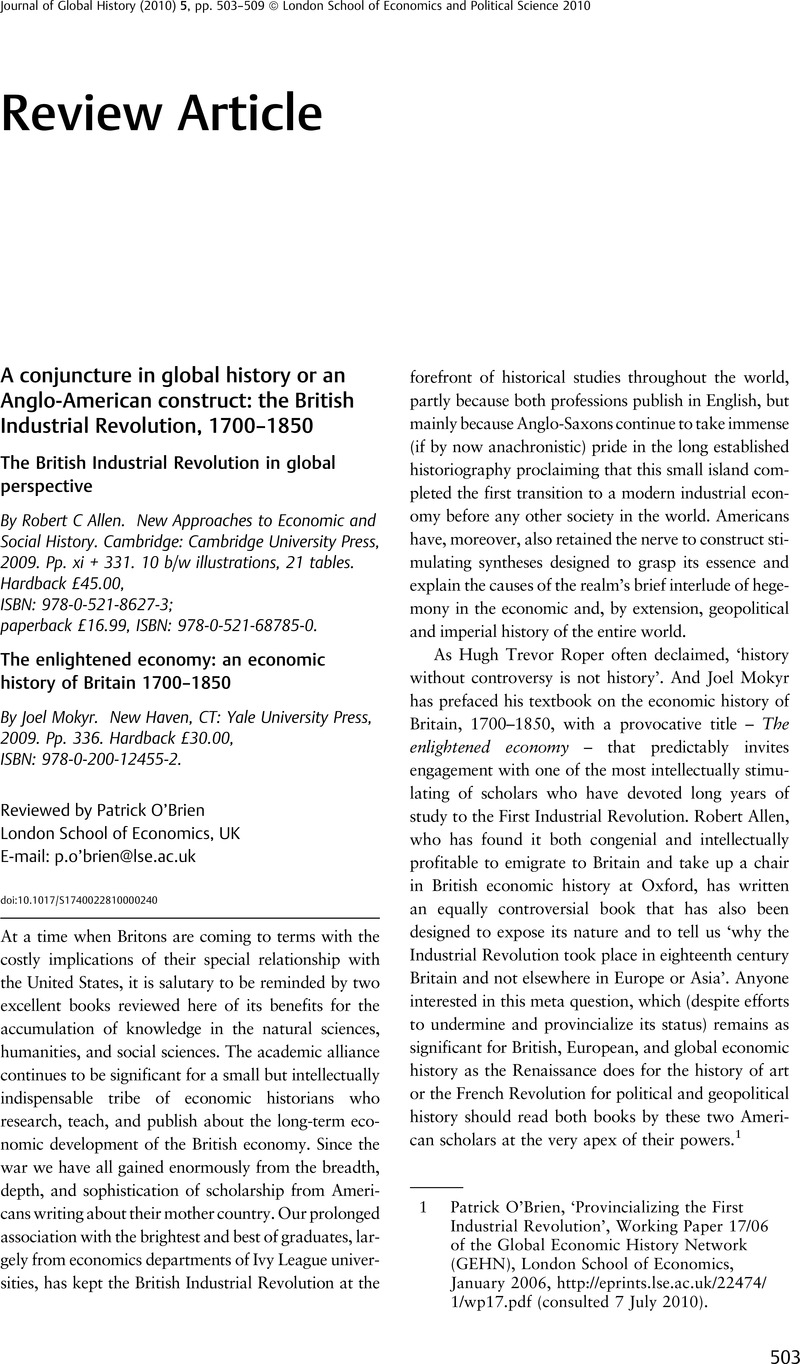Article contents
A conjuncture in global history or an Anglo-American construct: the British Industrial Revolution, 1700–1850
Published online by Cambridge University Press: 27 October 2010
Abstract

- Type
- Review Article
- Information
- Copyright
- Copyright © Cambridge University Press 2010
References
1 Patrick O’Brien, ‘Provincializing the First Industrial Revolution’, Working Paper 17/06 of the Global Economic History Network (GEHN), London School of Economics, January 2006, http://eprints.lse.ac.uk/22474/1/wp17.pdf (consulted 7 July 2010).
2 Vide the text by Martin Daunton, Progress and poverty: an economic and social history of Britain 1700–1850, Oxford: Oxford University Press, 1995, and the collection of survey essays edited by Roderick Floud and Paul Johnson, The Cambridge economic history of modern Britain, volume 1: Industrialisation, 1700–1860, Cambridge: Cambridge University Press, 2004.
3 Lyons, John S., Cain, Louis P. and Williamson, Samuel H. (eds.), Reflections on the cliometric revolution, London: Routledge, 2008Google Scholar.
4 McCloskey, Deirdre, The bourgeois virtues: ethics for an age of commerce, Chicago, IL: Chicago University Press, 2006CrossRefGoogle Scholar.
5 Israel, Jonathan I., Enlightenment contested: philosophy, modernity, and the emancipation of man 1670–1750, Oxford: Oxford University Press, 2010Google Scholar.
6 Kuznets, Simon, Modern economic growth: rate, structure and spread, New Haven, CT: Yale University Press, 1966Google Scholar.
7 Harris, J. R., Essays in industry and technology in the eighteenth century, Aldershot: Variorum, 1992Google Scholar.
8 Wrigley, E. A., Continuity, chance and change: the character of the Industrial Revolution in England, Cambridge: Cambridge University Press, 1988CrossRefGoogle Scholar.
9 These ideas and connections have also been explored by two other major and recent projects in European history. Vide Penelope Gouk (ed.), The Achievement Project 1990–95, Oxford, 1996; and Stefan R. Epstein and Maarten Prak (eds.), Guilds, innovation and the European economy, 1400–1800, Cambridge: Cambridge University Press, 2008.
10 Fox, Celina, The arts of industry in the Age of Enlightenment, New Haven, CT and London: Yale University Press, 2009Google Scholar.
11 Musson, A. E. and Robinson, Eric, Science and technology in the Industrial Revolution, Manchester: Manchester University Press, 1969Google Scholar.
12 These unpalatable and contestable views, which are in line with mainstream views of the period, will appear in a chapter written with Xavier Duran in Richard Unger (ed.), Shipping efficiency and economic growth 1350–1800, Leiden and Boston, MA: Brill, forthcoming 2010.
- 2
- Cited by




